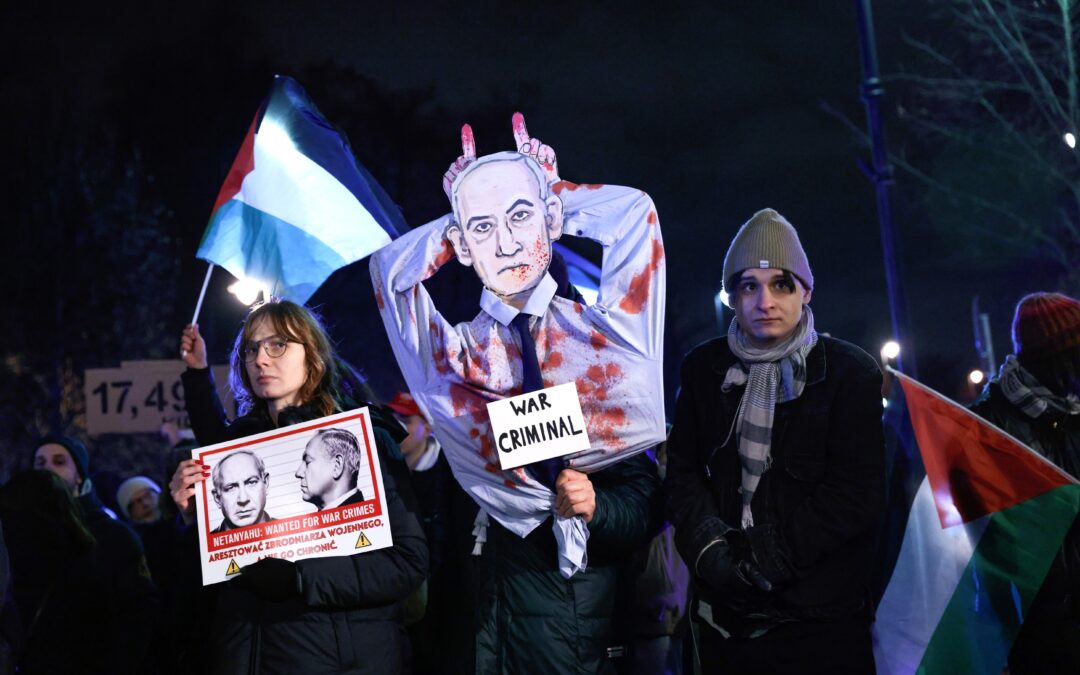Keep our news free from ads and paywalls by making a donation to support our work!

Notes from Poland is run by a small editorial team and is published by an independent, non-profit foundation that is funded through donations from our readers. We cannot do what we do without your support.
A protest took place in Warsaw this evening against the government’s announcement that it would ignore an International Criminal Court (ICC) arrest warrant against Benjamin Netanyahu if the Israeli prime minister visits Poland this month to attend the 80th anniversary of the liberation of Auschwitz.
Hundreds of demonstrators, many waving Palestinian flags, gathered in front of the presidential palace, from where they marched to the justice ministry and then the prime minister’s chancellery.
Participants chanted slogans including “Free Palestine” and “Arrest Netanyahu” and waved banners saying “Asylum for refugees, not genociders”, “Stop the genocide” and “War criminal”.
“As Poles, we are obliged to condemn war crimes. They must be punished regardless of the circumstances,” one participant told news website Wirtualna Polska. “The anniversary of the liberation of Auschwitz reminds us that there can be no consent to genocide.”
Protest przeciw polskiej ochronie dla Netanjahu idzie sprzed Kancelarii Prezydenta pod Ministerstwo Sprawiedliwości i Kancelarię Premiera. Jest kilkaset osób, skandują "aresztować Netanjahu". @OnetWiadomosci pic.twitter.com/UEpZyvQHVn
— Marcin Terlik (@MarcinTerlik) January 10, 2025
On 21 November last year, the ICC issued arrest warrants for Netanyahu and former Israeli defence minister Yoav Gallant on suspicion of war crimes and crimes against humanity during the armed conflict with Palestine. All of the ICC’s 124 members, including Poland, are, in theory, obliged to arrest the pair if they enter their territory.
But on Thursday this week, Prime Minister Donald Tusk announced that Poland “will not detain any representative of Israel” that visits Auschwitz for the anniversary on 27 January, which is also International Holocaust Remembrance Day.
Meanwhile, the government adopted a resolution saying that it “treats ensuring the safe participation of the leaders of Israel in the commemorations as part of paying tribute to the Jewish nation, millions of whose daughters and sons became victims of the Holocaust carried out by the Third Reich”.
The previous day, President Andrzej Duda, who is aligned with the conservative opposition, had written to Tusk calling on the government to guarantee safe passage for Netanyahu.
Polish officials have noted that so far there is no indication that Netanyahu will actually come to the event, and the government’s statements and resolution do not mention him by name.
Nevertheless, its decision has sparked controversy. Some critics accuse the government of undermining international law and of weakening Poland’s insistence that Vladimir Putin be arrested under the ICC warrant that was issued against him.
Others, however, have argued that the exceptional nature of Holocaust Remembrance Day and the importance of Auschwitz to the commemoration of the tragedy that befell Jews during the war justifies the government’s decision.
Poland has confirmed it will not comply with an ICC warrant to arrest Benjamin Netanyahu if he attends the 80th anniversary of the liberation of Auschwitz.
"No representative of Israel will be detained" if they attend the ceremony, says @donaldtusk https://t.co/X46WjSH1DT
— Notes from Poland 🇵🇱 (@notesfrompoland) January 9, 2025
In comments to Wirtualna Polska, the ICC emphasised that signatory states such as Poland are legally obliged to enforce the court’s decisions and cannot unilaterally judge their legitimacy.
“If states have concerns about cooperating with the court, they may consult the court in a timely and effective manner,” said the ICC’s press office.
Auschwitz was originally set up by Nazi Germany in occupied Poland as a camp to house Polish “political” prisoners before later becoming primarily a site for the murder of Jews.
At least 1.3 million victims were transported there, with at least 1.1 million of them killed at the camp. Around one million of those victims were Jews, most of whom were murdered in gas chambers immediately after their arrival. The second largest group of victims numerically were ethnic Poles.
Police have removed pro-Palestinian protesters who had begun to occupy part of the University of Warsaw.
They were called in by the rector because the protesters were blocking access to the university https://t.co/srIEOpemHA
— Notes from Poland 🇵🇱 (@notesfrompoland) June 12, 2024

Notes from Poland is run by a small editorial team and published by an independent, non-profit foundation that is funded through donations from our readers. We cannot do what we do without your support.
Main image credit: Dawid Zuchowicz / Agencja Wyborcza.pl

Alicja Ptak is deputy editor-in-chief of Notes from Poland and a multimedia journalist. She has written for Clean Energy Wire and The Times, and she hosts her own podcast, The Warsaw Wire, on Poland’s economy and energy sector. She previously worked for Reuters.



















